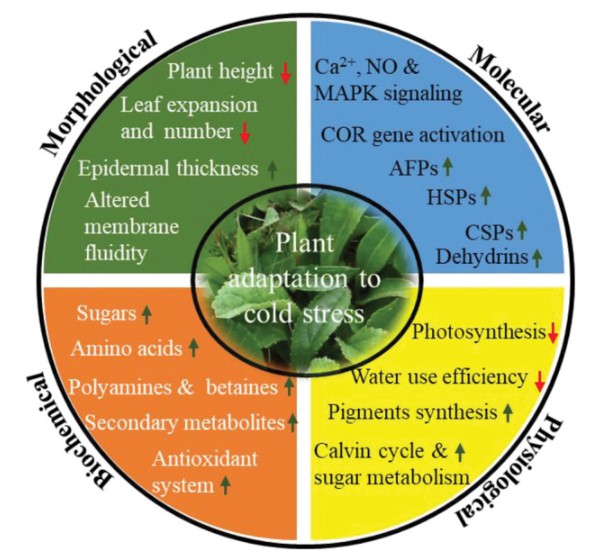Plants are constantly challenged by environmental stresses such as extreme temperatures, UV radiation, salinity, drought, flooding, mineral toxicity, and pathogen attacks. Among different environmental stresses, cold can severely alter membrane fluidity, water, and ion balance, generate reactive oxygen species (ROS), impair the stability of DNA, RNA, and proteins, hinder photosynthetic efficiency, and slow down biochemical reactions. These cellular and physiological changes reduce plant growth, development, and productivity and limit plant spatial and geographic distribution. Cold stress involves cold and/or freezing temperatures, which trigger completely different plant responses. Freeze tolerance is acquired through a cold acclimation process that involves prior exposure to nonlethal cold temperatures, followed by profound changes in cell membrane rigidity, transcriptome, compatible solutes, pigments, and cold-responsive proteins (e.g., antifreeze proteins). In addition, epigenetic mechanisms such as DNA methylation, histone modifications, chromatin dynamics, and small non-coding RNAs play a crucial role in cold stress adaptation.
 Fig. 1. Different morphological, biochemical, physiological, and molecular mitigation strategies acquired by plants upon cold stress. (Zinta et al., 2022)
Fig. 1. Different morphological, biochemical, physiological, and molecular mitigation strategies acquired by plants upon cold stress. (Zinta et al., 2022)
Understanding how plants respond and adapt to cold stress is essential for developing cold-tolerant plants. As one of the leading service providers in plant biotechnology, Lifeasible offers professional solutions for plant cold tolerance analysis.
We offer genome-wide association studies to analyze key genes that confer cold/freeze tolerance (e.g., protein kinases, ion transport proteins, biochemical/metabolic enzymes, and signaling components such as transcription factors).
We develop cold/freeze-tolerant crops with the help of genetic engineering techniques to generate overexpression/silencing lines of key regulatory genes for cold adaptation. Our techniques range from traditional breeding to modern biotechnology, such as clustered regularly interspaced short palindromic repeats (CRISPR) technology, epigenetic modification by altering methylation tags, etc.
There has been limited success in developing cold-resistant plants using traditional breeding methods. The main reason for this is that different plant species acquire cold tolerance in response to other factors, and most of them are a combination of multiple factors at the genetic and metabolic levels. Lifeasible provides strategies to develop cold-tolerant crops by simultaneously targeting various factors in a multidisciplinary approach. Depending on the plant species, the degree of cold tolerance required, the technology applied, and the genes/metabolites, we provide you with a customized strategy for developing cold-tolerant plants.
Cold stress is suffered to different degrees, and plants respond to it differently at different stages. The cell membrane system is the main part of the plant that suffers from frost damage, and increasing the plant's tolerance or insensitivity to freezing/cold stress can act as a first line of defense against the cold. We can regulate cell membrane composition or manipulate genes and proteins involved in sensing cold stress to achieve increased cold stress tolerance.
Different plant species sense and signal cold stress through the ICE-CBF-COR pathway through different but mostly conserved signaling cascades. We can pre-activate pre/constitutive phenotypes of genes in this pathway. Overexpression of signaling genes contributes to the preparation of endogenous freezing tolerance mechanisms.
Once a plant experiences cold stress, it activates its warriors to defend and protect itself from adverse effects. Plant cold stress warriors contain different proteins and metabolites that protect plant cells from freezing. We can increase the number of plant cold-stress warriors in advance or under specific conditions to modify the plant to adapt to cold-stress, including sugars (alginate, fructans), compatible solutes or osmoregulators, proline, glycine betaine and many other small molecules and metabolites. In addition, our solutions allow their expression under stress-inducible promoters.
Antifreeze proteins limit the formation of intracellular ice crystals and contribute to plant survival in cold environments. We can transfer single genes encoding antifreeze proteins into freeze-sensitive plants to provide plant freeze tolerance. We have successfully developed several cold-adapted antifreeze transgenic plants, such as corn, tomato, tobacco, sugar beet, potato, and others.
Lifeasible provides complete information on key genes associated with cold tolerance, essential for future studies of the specific molecular mechanisms underlying plant cold stress responses. In addition, we offer a variety of genetic manipulation strategies to enhance cold tolerance and develop cold-resistant plants. Contact us today to learn more about our solutions.
Reference